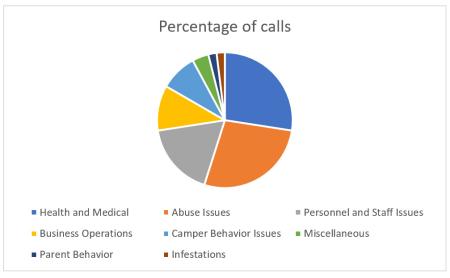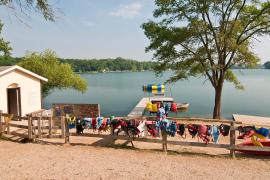The American Camp Association (ACA)’s Camp Crisis Hotline is a free, confidential, call-in resource for camp and youth development professionals that is available 24 hours a day, 365 days a year.
The Crisis Hotline Team consists of ACA staff members who are trained to listen and offer guiding questions a caller might consider when faced with a crisis or unexpected situation. Our goal for each call is to help the caller identify where in their own policies and procedures they might find a way to address the situation. We also share resources, many of which can be found on the Camp Crisis Hotline web page.
How do we define crisis? We don’t. A crisis is any situation for which a camp professional — regardless of their ACA membership or accreditation status — might want support. From bed bugs to wildfires, difficult parents to camper bullying, we take every call seriously and do our best to provide resources and considerations for next steps. We are not legal experts nor medical personnel, yet many of us are former camp professionals and know from experience how easily a crisis at camp can occur.
Historically, calls to the Crisis Hotline fall into broad categories, and we track the number of calls in these categories over time to give us a sense of emerging issues. With this information we create professional development resources to help camp professionals prepare for and mitigate crisis situations that might be new or particularly challenging.
Categories of calls this year:
- Health and Medical — 28% (44% of these calls were related to Staff Mental Health)
- Abuse Issues — 28%
- Personnel and Staff Issues — 18%
- Business Operations — 11%
- Camper Behavior Issues — 9%
- Miscellaneous — 4%
- Parent Behavior — 2%
- Infestations — 2%

Top Trends
Health and medical issues returned to the top category of calls in 2023.
This season highlighted how easily incidents outside of camp can greatly impact the camp community. From injury to death to issues at home and LGBTQ+ campers’ and staff members’ need for safe spaces, camps had to find resources to meet everyone’s mental health needs. Camps often called the hotline searching for resources to provide immediate counseling or how to support staff so that the season could continue. We noticed that most issues resulted from camps not having a process to directly connect a staff member with a local or virtual mental health professional.
- Mental health issues in staff
Issues of allegations of sexual abuse at camp and at home were plentiful last summer.
Some of the most challenging hotline calls to discuss are those centered around allegations of abuse. During the 2023 summer season 28 percent of the hotline calls were related to allegations of abuse. A shocking 56 percent were camper-to-camper abuse, around 25 percent concerned suspicions of abuse at home, and the remaining calls included staff-to-camper allegations. This was an essential reminder that we must continue to strive to make camp a safe space, while also understanding that because camp is a safe space, we should be prepared to respond to disclosures of abuse that has occurred outside of camp.
- Camper-to-camper abuse a continued concern
- Camps’ response to abuse that happens outside of camp
Handling staff and human resource challenges
The lack of policies and procedures around a host of staff issues created many challenges for camps. Questions included how to manage situations with minor or volunteer staff, how to manage challenges that arose during staff time off, and how to manage pregnancy among seasonal staff. Now is the time for you to consider your staff policies, reviewing them with an HR professional and identifying your camp’s qualified human resources or legal contact should a unique situation arise in the midst of camp season.
- Minor staff
- Expectations of staff during time off
- Seasonal staff health requirements
Business Operations
We know that business operations are at the core of a healthy camp. When a facility is not working as designed or external groups impact day-to-day operations, campers and staff are all affected. We find that good preparation for any major crisis can keep a camp moving forward. Having a strong crisis communication plan, ensuring all laws and regulations are followed, and having a good relationship with local law and health enforcement are best practices for keeping camp moving during a crisis.
- Essential facilities becoming unavailable
- Lack of mandated registrations or licenses
- Required responses to the media
Call Categories
Take a closer look at the call categories and consider some of the takeaways for your program. Our calls fall into the following general categories:
Health & Medical Issues — 28 percent of calls in 2023
Last summer the health and medical category returned to the top percentage of calls we handled. However, 44 percent of these calls were related to staff mental health.
As the nation continues to grapple with increased need for mental health support, camps are feeling the need to support their staffers even more. Mental health challenges can show up in individual ways — where a staff member may need to seek individual support — or in communal ways, where a camp seeks resources to support a group or all of their staff who may have been impacted by a tragic event.
Various other health issues, mostly related to communicable diseases and possible infestations, presented themselves last summer. It is critical that camps have policies, procedures, and training in place to address a variety of health and medical issues. As always, a health and medical support system should be in place to address these needs as they arise.
Calls in this category included:
- Death of a staff member and seeking mental health resources for all staff
- Camper considering self-harm and parents not taking it seriously
- Clarification on who can administer medication when the health professional is not on site
- International staff testing positive for an infectious disease
- Staff and campers expressing thoughts of death by suicide
Lessons Learned — Health and Medical Issues
Prepare for mental health concerns for staff and campers and have a health/medical support system in place. The number of calls to the Hotline on mental health concerns appears to mirror a societal trend. Camps need to have a mental health support system in place and should add mental health resources and experts to the team and healthcare plan. This plan includes not just your on-site healthcare staff, but the list of contacts you would phone in the event of the unexpected (e.g., mental health professionals, dentists, etc.).
Having a communicable disease plan in place is essential in the event that a minor or serious communicable disease outbreak occurs. Some 2023 callers needed support on how to respond to a variety of communicable diseases. Having a healthcare team and a response plan for common communicable diseases will always make the “what next” decision slightly easier.
Allegations of Abuse — 28 percent of calls in 2023
Sharing the top category for the percentage of calls, allegations of abuse appear to be on the rise, particularly with regard to camper-to-camper abuse. These calls were particularly challenging as callers were trying to determine how much they should investigate, if a situation was a result of bullying or a mistake, if they should call a parent or child protection services first, or even which state child protection service they should contact.
A clear policy on how to handle allegations of abuse, whether they are reported during a camp session or are revealed after a camper goes home, will help guide camp administrators through these highly emotional conversations. Ensuring your staff are trained and understand their responsibilities for recognizing and reporting suspected abuse will create a safer environment for campers. Likewise, working with your local social services agency or law enforcement agencies will ensure that your policies align with local laws and practices.
Calls within this category included:
- Parents wanting information on a camper accused of abusing their child
- Camper refusing to go home due to feeling unsafe
- Staff members and campers sending inappropriate texts/photos to campers
- Reports of camper-to-camper abuse after camp has ended
Lessons Learned — Allegations of Abuse
Attentive, active, and involved staff supervision is the key to keeping campers from harming, bullying, or abusing each other. Allegations of camper-to-camper abuse often happen in those brief moments when staff are not directly engaged with campers — shower time, trips to the restroom, changing for the pool, the time between program and mealtime, just prior to bedtime, etc. It is imperative that your staff be trained to be even more watchful during these vulnerable times. If your camp does not have staff sleeping in the same room with campers, consider what you are doing to ensure there is no inappropriate behavior in the middle of the night.
See something, say something — teach your staff and campers to be ever vigilant and question what they see. It takes just one person to step up and question when they see something not right about the way an adult is interacting with a child. You may be the one who is able to free a child from serial abuse. Always have the best interest of the child in mind.
Staff Issues — 18 percent of calls in 2023
From the first interview until the day a contract ends, it is important that camps have policies and procedures in place so staff understand what their expectations are and camp administrators are aware of the process they will take should issues arise. This category had a range of challenges, which essentially boiled down to having good-quality human resource policies and procedures in place. Many callers sought guidance on managing situations with minor staff, volunteer staff, and staff challenges that came up during time off. Calls within this category included:
- Healthcare staff member smoking at camp
- Staff member disclosing unsafe environment at their home
- Staff dismissal and not the legal responsibility of the camp
- Staff administering medication outside of camp policy
- Staff complaints that there wasn’t good leadership at camp
- Seasonal staff concerned about campers’ safety
- Staff being required to shower with campers
Lessons Learned:
Staff must be clear on expectations about their behavior and interactions with campers in and out of cabins. This should also include expectations outside of camp. Be clear, too, about consequences and actions that will occur if policies are not followed. Be sure to have your attorney review all polices.
Identify an employment attorney to provide you with legal counsel. Identify this resource before you begin your hiring cycle. An attorney with experience in labor laws, contracts, and employment issues that you can contact for help at any time is an invaluable resource for any camp.
Maintain personnel policies that are clear about use of alcohol, drugs, and sexual conduct. Ensure that all staff are trained and understand the policies and the consequences of their actions. This is another document you should have reviewed by your legal counsel.
Business Operations
Rising as a category to be mindful of, camps experienced more situations that affected day-to-day operations last year.
From building fires to complaints that lead to regulators conducting multiday investigations, having communication and contingency plans in place is essential. We know that camp leaders continue to grapple with insurance issues, staff recruitment and retention, staff wages and support, changes to laws and regulations, and managing forest fires, smoke, and other natural occurrences. When a camp has thought through who within their local community can provide various levels of support and who would speak to the media should they show up at a camp’s gate, it becomes a bit more manageable to continue camp operations while successfully managing a crisis. Calls within this category included:
- A camp losing a brand-new building to fire
- A community member questioning whether a camp was licensed and had mandated reporters on site
- A media outlet publishing a story about a camp's gender policies for staff and camper supervision
- Camps seeking general public relations and communication support
Lessons Learned:
Ensure that you have access and know who to contact at your insurance company for property insurance. Know your policy before the season begins. What does it cover? What doesn't it cover? Know your coverage limits, what triggers business interruption insurance, and who to contact if you need assistance. Have a plan for communicating to staff, campers, parents, and key stakeholders.
Develop communication templates in the off-season. Think about the potential communication scenarios you may need to manage. Have templates available that you can plug information into. It is a lot easier to think clearly when you are not in the middle of a situation.
Be clear about your policies and procedures. Gender inclusivity has been a hot topic for some media outlets. Be sure to have templates ready to communicate effectively with your stakeholders.
Know the federal, state, and local laws and regulations for operating your camp. Build relationships with your local regulators. Having a relationship with your local regulators can be helpful if and when issues arise at your camp. From a norovirus outbreak to licensing, local agencies can be very helpful.
Create and maintain a camp culture that prevents and reports potential abuse, and know the reporting laws for your state. Ensure that you have mandated reporters on your team and that everyone is working together to protect children.
Implications for Your Camp — Summer 2023 Case Studies
As you might expect, the calls we receive rarely fit neatly into one category. Each crisis is unique, and it is in this uniqueness that we find the most opportunity for learning and preparedness. The crisis scenarios we share herein represent what we consider emerging trends based on the number of calls with similar themes we received this past year, and in some cases, the last several years. Each shared scenario includes questions you might ask during staff training and questions you might consider when reviewing your camp’s policies and risk-management plans.
While each case is based on actual calls we received to the Crisis Hotline last year, they have been adjusted to maintain the confidentiality of the callers and their situations. You’ll also notice that we do not provide the after story. That is in part circumstantial — we do not often hear how the story ends — and partly intentional. Each case is meant to prompt critical examination of your own policies and practices rather than to suggest that every camp can follow the same steps and reach the same outcome.
Wrapping Up: Preparing for Crisis at Your Camp
Camp is a place full of the unexpected, and as these case studies illustrate, the unexpected can include situations that are difficult and frightening. We hear hundreds of stories from camp professionals each year about the crises they face — and no crisis is too big or too small to justify a call to the ACA Camp Crisis Hotline. Some situations might be preventable through regular and systematic emergency action planning; others simply are not. But all are important opportunities for learning, both at your camp and as a community of camp professionals.
We hope the cases and prompts covered here serve as a starting point for dialogue and critical examination of your policies, practices, and staff training.
A few things to remember about the ACA Camp Crisis Hotline:
- It is available to any camp professional experiencing what they feel is a crisis, regardless of ACA membership or accreditation status.
- It is free and confidential, available around the clock, 365 days a year.
- It is staffed by ACA staff members with experience working at camp but who are not legal or medical experts.
- Our most shared resources are available at ACAcamps.org/resource-library/camp-crisis-hotline.
Call us at 800-573-9019.
Crisis Hotline Recommendations for Emergency Preparedness
While each case is unique, we find ourselves asking callers to the Crisis Hotline a similar set of questions. The following recommendations are based on these questions, and while they will not prevent a crisis, they are things you’ll want in your tool kit should you face an unexpected crisis at camp.
- Develop a working relationship with your insurance company and representative. Review their resources so you know what they can and can’t do. Know and understand the limits and coverages afforded your camp by your various insurance policies.
- Ensure access to legal counsel. Consider it an investment. If finances are an issue for retaining legal counsel year round, consider alternative means of accessing such counsel (e.g., compiling a list and reaching out to local law schools, members of camp or agency board of directors, camper parents/families, alumni, other nearby camps, community legal aid clinics, your insurance company, etc.)
- Ensure access to mental health professionals. Develop relationships with and a network of mental health professionals, including social workers, counselors, therapists, family counselors, or other professionals who are available and willing to be both on site and on call to help with camper and staff mental, emotional, spiritual, or relationship issues and needs.
- Develop a thorough crisis communication plan. In the event of a serious accident, incident, injury, or infestation, an excellent communications plan is critical. The well-prepared camp has considered and prepared their key messages for a variety of audiences (parents, media, staff, board, etc.) and a variety of possible scenarios common to camp. When possible, camps should consider employing an experienced public relations professional or securing access to such a professional should the need arise.
- Review your supervision policies and procedures. Attentive, active, and involved staff supervision is the key to keeping campers from harming each other. Well-enforced and intentional supervision policies are critical in decreasing camper behavior issues. Camps must ensure that their procedures and staff training are designed not only to protect the safety of campers, but also to identify situations where campers could be tempted to behave inappropriately.
The views and opinions expressed by contributors are their own and do not necessarily reflect the views of the American Camp Association or ACA employees.





